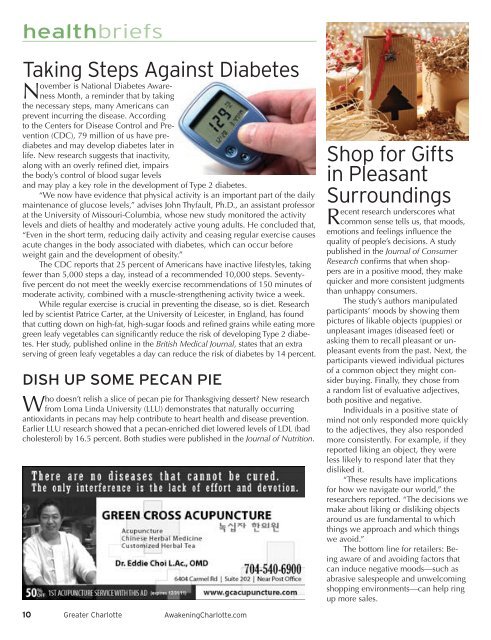2Over-training. - Natural Awakenings Magazine Charlotte
2Over-training. - Natural Awakenings Magazine Charlotte
2Over-training. - Natural Awakenings Magazine Charlotte
Create successful ePaper yourself
Turn your PDF publications into a flip-book with our unique Google optimized e-Paper software.
healthbriefs<br />
Taking Steps Against Diabetes<br />
November is National Diabetes Awareness<br />
Month, a reminder that by taking<br />
the necessary steps, many Americans can<br />
prevent incurring the disease. According<br />
to the Centers for Disease Control and Prevention<br />
(CDC), 79 million of us have prediabetes<br />
and may develop diabetes later in<br />
life. New research suggests that inactivity,<br />
along with an overly refined diet, impairs<br />
the body’s control of blood sugar levels<br />
and may play a key role in the development of Type 2 diabetes.<br />
“We now have evidence that physical activity is an important part of the daily<br />
maintenance of glucose levels,” advises John Thyfault, Ph.D., an assistant professor<br />
at the University of Missouri-Columbia, whose new study monitored the activity<br />
levels and diets of healthy and moderately active young adults. He concluded that,<br />
“Even in the short term, reducing daily activity and ceasing regular exercise causes<br />
acute changes in the body associated with diabetes, which can occur before<br />
weight gain and the development of obesity.”<br />
The CDC reports that 25 percent of Americans have inactive lifestyles, taking<br />
fewer than 5,000 steps a day, instead of a recommended 10,000 steps. Seventyfive<br />
percent do not meet the weekly exercise recommendations of 150 minutes of<br />
moderate activity, combined with a muscle-strengthening activity twice a week.<br />
While regular exercise is crucial in preventing the disease, so is diet. Research<br />
led by scientist Patrice Carter, at the University of Leicester, in England, has found<br />
that cutting down on high-fat, high-sugar foods and refined grains while eating more<br />
green leafy vegetables can significantly reduce the risk of developing Type 2 diabetes.<br />
Her study, published online in the British Medical Journal, states that an extra<br />
serving of green leafy vegetables a day can reduce the risk of diabetes by 14 percent.<br />
DISH UP SOME PECAN PIE<br />
W ho doesn’t relish a slice of pecan pie for Thanksgiving dessert? New research<br />
from Loma Linda University (LLU) demonstrates that naturally occurring<br />
antioxidants in pecans may help contribute to heart health and disease prevention.<br />
Earlier LLU research showed that a pecan-enriched diet lowered levels of LDL (bad<br />
cholesterol) by 16.5 percent. Both studies were published in the Journal of Nutrition.<br />
10 Greater <strong>Charlotte</strong> Awakening<strong>Charlotte</strong>.com<br />
Shop for Gifts<br />
in Pleasant<br />
Surroundings<br />
Recent research underscores what<br />
common sense tells us, that moods,<br />
emotions and feelings influence the<br />
quality of people’s decisions. A study<br />
published in the Journal of Consumer<br />
Research confirms that when shoppers<br />
are in a positive mood, they make<br />
quicker and more consistent judgments<br />
than unhappy consumers.<br />
The study’s authors manipulated<br />
participants’ moods by showing them<br />
pictures of likable objects (puppies) or<br />
unpleasant images (diseased feet) or<br />
asking them to recall pleasant or unpleasant<br />
events from the past. Next, the<br />
participants viewed individual pictures<br />
of a common object they might consider<br />
buying. Finally, they chose from<br />
a random list of evaluative adjectives,<br />
both positive and negative.<br />
Individuals in a positive state of<br />
mind not only responded more quickly<br />
to the adjectives, they also responded<br />
more consistently. For example, if they<br />
reported liking an object, they were<br />
less likely to respond later that they<br />
disliked it.<br />
“These results have implications<br />
for how we navigate our world,” the<br />
researchers reported. “The decisions we<br />
make about liking or disliking objects<br />
around us are fundamental to which<br />
things we approach and which things<br />
we avoid.”<br />
The bottom line for retailers: Being<br />
aware of and avoiding factors that<br />
can induce negative moods—such as<br />
abrasive salespeople and unwelcoming<br />
shopping environments—can help ring<br />
up more sales.







